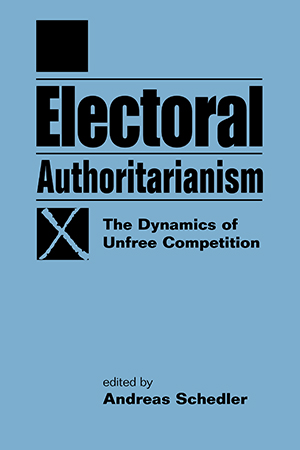Today, electoral authoritarianism represents the most common form of political regime in the developing world and the one we know least about. Filling in the lacuna, this new book presents cutting-edge research on the internal dynamics of electoral authoritarian regimes.
Each concise, jargon-free chapter addresses a specific empirical puzzle on the basis of careful cross-national comparison. The result is a systematic, clearly structured study of the interaction between rulers and opposition parties in the central arena of struggle under electoral authoritarianism, the electoral battlefield.
Andreas Schedler is professor of political science and chair of the Department of Political Science at CIDE, Mexico City. Among his publications is The Self-Restraining State: Power and Accountability in New Democracies.
"This unique and rich volume ... makes a substantively important contribution to knowledge about elections as they happen in a large part of the developing world."—Alberto Simpser, Perspectives on Politics
"Seeking answers to ... important contemporary questions, Electoral Authoritarianism provides substantial material for the political comparativist, democratic scholar-practitioner and social science graduate student to mine.... Informative, honest, readable, and logically organized."—Amichai Magen, International Studies Review
"An unusually valuable compendium of first-class papers by a group of eminent scholars.... Highly recommended." —Choice
"This important book helps to advance a paradigm shift in comparative politics that restores the study of varieties of autocracy to their rightful placethat is, alongside, but separate from, the study of emerging and consolidated democracies. Strongly recommended for all scholars of comparative politics."—Michael Bratton, Michigan State University
"A great value of this study is its unambiguous confrontation with the numerous publications on the 'transition to democracy' that are bogged down in their assumption that introducing democratic institutions necessarily means that regimes will become more liberal and free."—Lucy Creevey, University of Connecticut








